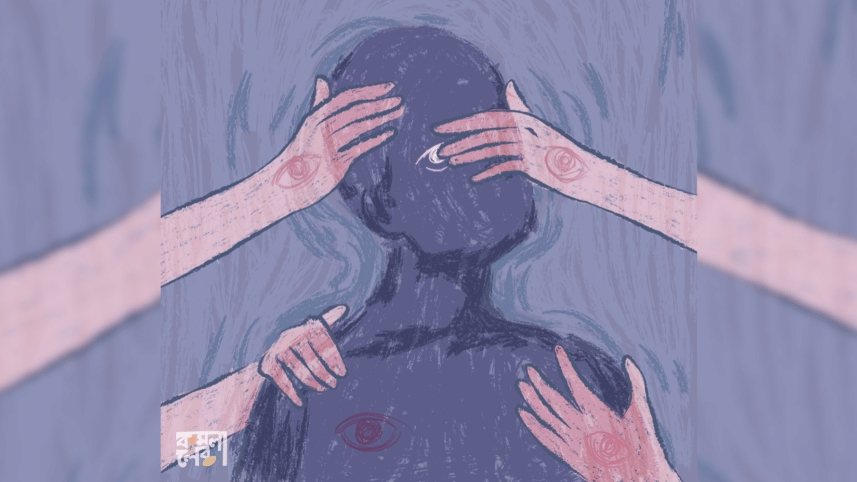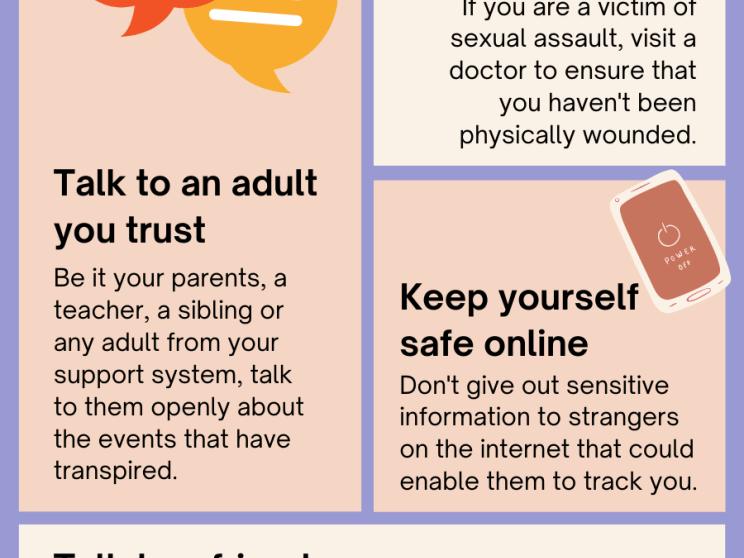Grooming: abuse hiding in plain sight

Trigger warning: mentions and/or graphic details of sexual abuse
Young people tend to trust the adults in their inner circle because they have a natural naiveté towards life, which is the way it should be. Adults should be there in a child's life to guide and protect them. This makes it doubly tragic to fathom that a large proportion of grooming cases have adults as the abusers and children, usually between the ages of 12 and 15, as the victims.
Grooming is a gradual process of manipulation in which an abusive person forges an emotional bond and instils a sense of dependency in order to exploit another person.
It's very unlikely that an abuser will outright approach a child and make it known that they are looking to gain something — sexual favours or otherwise. What happens in the majority of these cases is that the perpetrator establishes a relationship of trust and friendship with the victim.
Slowly and tactfully, the abuser will make the victim divulge personal information. In most cases, the abuser uses these facts to emotionally manipulate the victim to the point where they become dependent on the abuser. Victims with issues in their personal life might need a shoulder to lean on, which the perpetrator can weaponise and make themself seem indispensable.

More often than we'd like to believe, victims are subjected to abuse from people in their close vicinity. Be it a teacher or a colleague, a relative or an acquaintance, it is likely that the victim knows the person. A prior relationship means there already exists confidence between the victim and the perpetrator, making it easier for them to assert themselves into the victim's life.
After laying the groundwork, the abuser can proceed to emotionally isolate the victim from their friends, family, and other support systems so they do not feel comfortable to openly talk about their abusive relationship.
20-year-old Mahir Azwad* was groomed by his teacher from the ages of 15 to 16. "Things escalated to the extent where she isolated me from all my friends," he recounts. "I trusted her a lot because she was a friend and a mentor. I genuinely believed she meant well towards me. So, when she tried warning me off of my friends, I believed her and distanced myself from them. At one point, she was my only social contact and it was only her I would trust my personal life with."
Once the predator has ensured that the victim is caught in their web, they may proceed to ask for sexual favours, even using various tactics to guarantee that the victim can't leave them.
"We started speaking over Discord, where she first made contact. She convinced me she was suicidal, had no friends and was extremely depressed," says Azad Hossain*, 18, who was groomed by a 22-year-old woman when he was only 14 years old. He continues, "In a way she manipulated me into believing that if I severed contact with her, she might try to harm herself."
Some young adults may not come from a financially stable background, which the perpetrator can abuse. By offering financial incentives, gifts, or privileges, the person can influence the victim into staying with them.

One of the most profound complexities of grooming is that victims often tend to not understand the gravity of the issue, even going so far as to defend their groomers. Abusers present themselves in ways which make it difficult for the victim to believe that a person who goes to such lengths to be helpful could ever harm them. Perpetrators also actively askew any form of rationalisation victims make of the situation, making it difficult to view them in a negative light.
Amreeta Lethe Chowdhury, 23, was groomed by her teacher at 16. Speaking on the difficulties of breaking out of the cycle, she says, "He established himself as a very close mentor who wanted me to do very well in life. He also situated himself in an older brother role."
"I was not aware at all that I was being groomed because I was convinced that he was exactly as he portrayed himself to be. He put himself in a position of knowledge and trust from which he monitored my relationships, making me view him as a greater friend than my other friends," she adds.
Grooming can also happen in adolescent intimate relationships, where one of them is closer to adulthood than their partner. If there is hesitancy in regards to physical intimacy from one end, the abuser often uses these tactics over a period of time to build a false sense of emotional connection for sexual favours.
The perpetrator can mould the situation in such a way that the power dynamics tip in their favour, making it easier to exercise their will. Thus, even when victims become aware of their situation, they may be pressured into staying in the relationship and not revealing it to others in fear of repercussions or that others might not believe them. The fear of being ridiculed for being in a relationship of this sort can also influence their decision to not come out with it, as was the case with Azad.
Grooming is not necessarily restricted to real-life interactions. Over the years, cases of online grooming have risen astronomically, becoming one of the most common variants of online child sexual abuse. Being online, the perpetrator has the added advantage of being hidden behind a veil of anonymity, where they can easily catfish the victim by lying about their age or sex.
The victim might also believe it is okay to form connections with people online because can easily sever contact if necessary. However, that does not always end up being the case. It is possible for the perpetrator to place themself so intimately in the victim's life or gain such crucial information on the victim that it becomes exceptionally difficult to end the relationship.
While it may be unsavoury to think about, certain victims might actually be willing to engage in a romantic and/or sexual relationship with a much older abuser because of normalisation and glorification of age gaps in films, literature, and other media. Older men chasing younger women without consent is often shown as something desirable because older men are portrayed as being more mature and attractive. Likewise, younger men securing the affections of older women is also glorified. These portrayals are often problematic and can askew how a young, impressionable mind views and interacts with romantic entanglements in the long run.

The long-term effects of grooming can be devastating for a victim. Dr Tumpa Indrani Ghosh, Child and Adolescent Psychiatry Consultant at Lifespring and Assistant Professor at Mymensingh Medical College, says, "Victims are left vulnerable after the incident. They fall prey to anxiety and depression, and they become more prone to substance abuse. Unable to form proper, meaningful relationships in the fallout, they may become socially withdrawn. Moreover, their appetite and sleep patterns can change drastically for the worse."
"I felt betrayed by the whole thing. It has given me certain trust issues and made me more wary of older men trying to establish a relationship like that with me," adds Amreeta.
Grooming is incredibly deceptive, but there are a few signs people can look out for. For instance, if a child has expensive gifts and they refuse to disclose who gave them can be an indicator of grooming. Another sign could be a child showing an inexplicable interest towards a particular person, and/or showing diminished desire to partake in activities they previously enjoyed. In the past, if the child had a friendly relationship with their family or friends and regularly shared details of their life with their close ones but are suddenly very uncommunicative, it might be time to have a conversation with them.
When someone opens up to you about grooming, it's important to listen carefully, let them know they've done the right thing by telling you, and emphasise how it's not their fault or reflective of them in any way. Do not immediately confront the alleged abuser. Instead, explain the mode of action and report what the child has told you to relevant authorities as soon as possible.
When asked how victims' understanding of grooming developed, many said that they had not been familiar with the terminology or process early on, and only got to know about grooming through social media or conversations much later. Awareness helps people be on the lookout before they find themselves confined to a viciously damaging relationship. The connotations surrounding grooming are certainly not easy to discuss, but it is a conversation that we need to have.
*Names have been changed upon request
References:
1. National Society for the Prevention of Cruelty to Children (July 7, 2022). Online Grooming Cases Have Risen By More than 80% in 4 Years
2. Modern Intimacy (October 5, 2020). What is Grooming? The Long Game Strategy of Exploitation by Dr. Kate Balestrieri
3. Raising Children. Grooming: Recognising the Signs
The writers are contributors at SHOUT. Reach out to us at zaima2004adrita@gmail.com and shanumsarkar18@gmail.com




 For all latest news, follow The Daily Star's Google News channel.
For all latest news, follow The Daily Star's Google News channel. 

Comments